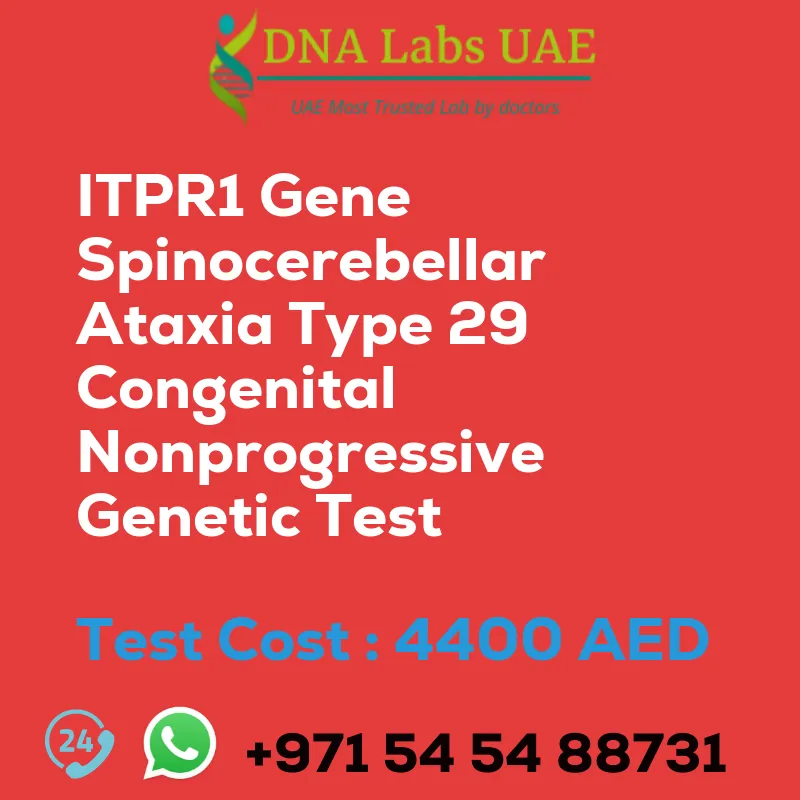ITPR1 Gene Spinocerebellar Ataxia Type 29 Congenital Nonprogressive Genetic Test
Test Name: ITPR1 Gene Spinocerebellar Ataxia Type 29 Congenital Nonprogressive Genetic Test
Components: Blood or Extracted DNA or One drop Blood on FTA Card
Price: 4400.0 AED
Sample Condition: Blood or Extracted DNA or One drop Blood on FTA Card
Report Delivery: 3 to 4 Weeks
Method: NGS Technology
Test Type: Neurological Disorders
Doctor: Neurologist
Test Department: Genetics
Pre Test Information: Clinical History of Patient who is going for ITPR1 Gene Spinocerebellar Ataxia Type 29, congenital nonprogressive NGS Genetic DNA Test. A Genetic Counselling session to draw a pedigree chart of family members affected with ITPR1 Gene Spinocerebellar Ataxia Type 29, congenital nonprogressive.
Test Details
ITPR1 gene spinocerebellar ataxia type 29, congenital nonprogressive is a genetic disorder characterized by ataxia, which is a lack of muscle coordination, particularly in the limbs. This condition is caused by mutations in the ITPR1 gene, which provides instructions for making a protein called inositol 1,4,5-trisphosphate receptor type 1.
NGS genetic testing, also known as next-generation sequencing, is a technique used to analyze multiple genes simultaneously and identify genetic variations or mutations. In the case of spinocerebellar ataxia type 29, NGS genetic testing can be used to detect mutations in the ITPR1 gene.
The congenital nonprogressive form of spinocerebellar ataxia type 29 means that the symptoms are present from birth and do not worsen over time. This distinguishes it from other forms of spinocerebellar ataxia that may have a progressive nature.
NGS genetic testing can help in the diagnosis of spinocerebellar ataxia type 29 by identifying specific mutations in the ITPR1 gene. This information can be useful for genetic counseling, determining the risk of passing on the condition to offspring, and potentially guiding treatment options in the future.
It is important to consult with a healthcare professional or genetic counselor to discuss the appropriateness and availability of NGS genetic testing for spinocerebellar ataxia type 29, congenital nonprogressive. They can provide further information and guidance based on an individual’s specific situation.
| Test Name | ITPR1 Gene Spinocerebellar ataxia type 29 congenital nonprogressive Genetic Test |
|---|---|
| Components | |
| Price | 4400.0 AED |
| Sample Condition | Blood or Extracted DNA or One drop Blood on FTA Card o |
| Report Delivery | 3 to 4 Weeks |
| Method | NGS Technology |
| Test type | Neurological Disorders |
| Doctor | Neurologist |
| Test Department: | Genetics |
| Pre Test Information | Clinical History of Patient who is going for ITPR1 Gene Spinocerebellar ataxia type 29, congenital nonprogressive NGS Genetic DNA Test A Genetic Counselling session to draw a pedigree chart of family members affected with ITPR1 Gene Spinocerebellar ataxia type 29, congenital nonprogressive |
| Test Details |
ITPR1 gene spinocerebellar ataxia type 29, congenital nonprogressive is a genetic disorder characterized by ataxia, which is a lack of muscle coordination, particularly in the limbs. This condition is caused by mutations in the ITPR1 gene, which provides instructions for making a protein called inositol 1,4,5-trisphosphate receptor type 1. NGS genetic testing, also known as next-generation sequencing, is a technique used to analyze multiple genes simultaneously and identify genetic variations or mutations. In the case of spinocerebellar ataxia type 29, NGS genetic testing can be used to detect mutations in the ITPR1 gene. The congenital nonprogressive form of spinocerebellar ataxia type 29 means that the symptoms are present from birth and do not worsen over time. This distinguishes it from other forms of spinocerebellar ataxia that may have a progressive nature. NGS genetic testing can help in the diagnosis of spinocerebellar ataxia type 29 by identifying specific mutations in the ITPR1 gene. This information can be useful for genetic counseling, determining the risk of passing on the condition to offspring, and potentially guiding treatment options in the future. It is important to consult with a healthcare professional or genetic counselor to discuss the appropriateness and availability of NGS genetic testing for spinocerebellar ataxia type 29, congenital nonprogressive. They can provide further information and guidance based on an individual’s specific situation. |








